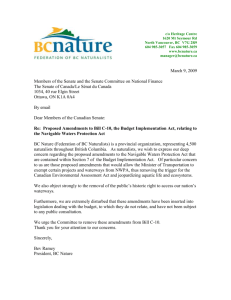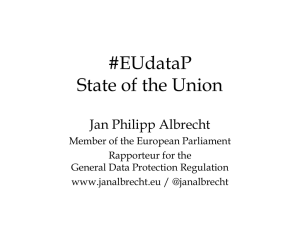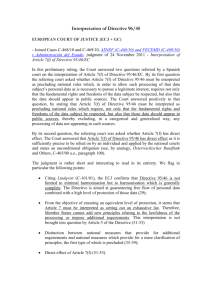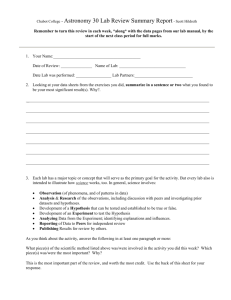Company Law Committee meeting minutes for 13 December 2005
advertisement
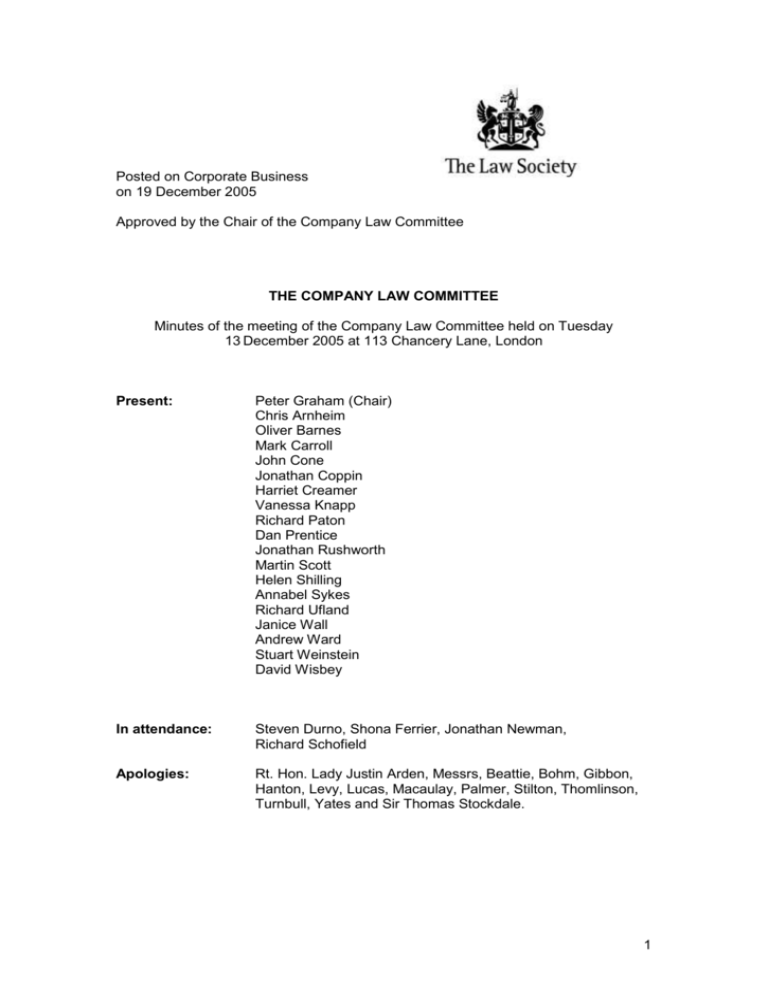
Posted on Corporate Business on 19 December 2005 Approved by the Chair of the Company Law Committee THE COMPANY LAW COMMITTEE Minutes of the meeting of the Company Law Committee held on Tuesday 13 December 2005 at 113 Chancery Lane, London Present: Peter Graham (Chair) Chris Arnheim Oliver Barnes Mark Carroll John Cone Jonathan Coppin Harriet Creamer Vanessa Knapp Richard Paton Dan Prentice Jonathan Rushworth Martin Scott Helen Shilling Annabel Sykes Richard Ufland Janice Wall Andrew Ward Stuart Weinstein David Wisbey In attendance: Steven Durno, Shona Ferrier, Jonathan Newman, Richard Schofield Apologies: Rt. Hon. Lady Justin Arden, Messrs, Beattie, Bohm, Gibbon, Hanton, Levy, Lucas, Macaulay, Palmer, Stilton, Thomlinson, Turnbull, Yates and Sir Thomas Stockdale. 1 PART A – LAST MEETING 1. MINUTES OF THE LAST MEETING The minutes of the last meeting were approved for signature by the Chairman. 2. MATTERS ARISING FROM THE MINUTES UNCITRAL Model Law on Cross Border Insolvency: the memorandum had been submitted to the Insolvency Service which had indicated that it would arrange a meeting to discuss the Committee’s concerns in due course. PART B – MATTERS FOR DECISION OR DISCUSSION 3. COMPANY LAW REFORM BILL The Committee had received copies of the briefing for the Second Reading debate in the House of Lords and a note of the meeting with the Conservative and Liberal Democrat spokesmen on 8 December 2005. Contact details for the working party leaders had been provided to the spokesmen and they might be contacted for additional briefings or further information. In the event of such contact, members of the Committee were requested to advise the Chairman and the Law Society. A lobbying strategy drafted by the Parliamentary Unit was tabled for discussion at the meeting. The Second Reading briefing would be sent to 200 peers identified as potentially interested in the Bill by the Society’s Parliamentary monitors. The Unit had already been approached by Labour peers including Professor Lord Wedderburn and if appropriate could arrange a meeting to brief Labour and cross bench peers early in the New Year. The Parliamentary Unit would be happy to arrange further meetings to brief peers as requested as the Bill proceeded. The provisional date for Second Reading was 11 January 2006 with the Committee stage likely to start in the week commencing 23 January 2006. The Bill would be considered in detail in Grand Committee rather than on the floor of the House, entailing twice weekly sessions until the Easter recess. While amendments could not be put to the vote, Opposition parties would still appreciate briefing materials and draft amendments as soon as practicable. The Society’s amendments would be distributed to party spokesmen, all solicitor peers and all of those who spoke on the Second Reading or in Committee. The suggested strategy included the organisation of a lobby meeting with other bodies to brief peers and the media on particular issues of concern, for example, to seek the deletion of the clauses on directors’ duties. However, this suggestion was not endorsed by the Committee. Subject to availability, members would be willing to attend a further meeting with peers to explain the issues. The Committee would in any event remain in contact with DTI officials during the passage of the Bill. 2 The Parliamentary Unit would provide a tabulated summary of the Hansard reports identifying the outcome of debates on amendments to help the Committee identify whether to press amendments at the Report stage when votes could be taken. Committee members asked how best to deal with generic issues which recurred throughout the Bill such as the provisions on offences. The Committee was advised to recommend a probing amendment to delete the clause when such a provision first appeared in the Bill and including the deletion of all other similar clauses. Briefing on the principle at issue and the reasons for deletion should be provided. Where an amendment would have consequential effects on other clauses, the Committee was recommended to identify all of the necessary amendments to enable the Minister to respond, hopefully, that he would need to give the issue further consideration and would report back at a later stage. The Committee did not consider there to be much scope for media interest in the Bill. However, it was suggested that an article by a member of the Committee might be published by the Financial Times. The Chairman would discuss this possibility further with Harriet Creamer. The DTI had requested a meeting on the Bill which had been arranged for 21 December. The DTI had identified the public/private split, capital maintenance and the takeover provisions for discussion. Members were agreed on the desirability of harmonising the definitions of offer to the public for the purposes of prospectus law and the public/private split but were unable to identify an appropriate solution. Members were requested to direct any thoughts on a suitable solution to the Chairman ahead of the meeting with the DTI. The Committee’s views at the time of the implementation of the Prospectus Directive would also be reviewed. On maintenance of capital, the DTI was expected to raise the deregulation of the payment of dividends by private companies and comments in Jonathan Rickford’s 2004 BIICL report of Reforming Capital would be reviewed. 4. FSA QUARTERLY CONSULTATION ON AMENDMENTS TO THE HANDBOOK The Committee agreed to approve the working party paper submitted to the Financial Services Authority in response to those parts in the Consultation Paper 05/14 dealing with changes to the Collective Investment Schemes Sourcebook and the New Collective Investment Schemes Sourcebook subject to typographical corrections and the provision of definitions of the acronyms used in the paper; likewise on behalf of the Bar Law Reform Committee. PART C – MATTERS FOR CONSIDERATION OR REPORT 5. INSOLVENCY Clause 868 of the Bill amended the Insolvency Act 1986 so that where necessary assets subject to a floating charge would be available to fund the general expenses of liquidation. The Insolvency Service would have the power to introduce rules providing a mechanism for the floating charge holder to agree the quantum of general liquidation expenses recovered by a liquidator on which there were to be consultations. The amendment would 3 reverse the judgment in Leyland Daf Ltd on which the Committee had no particular stance. 6. FINANCIAL SERVICES AND MARKETS ACT (a) Financial Services Authority: the FSA’s Better Regulation Action Plan indicated that in future it would move away from detailed prescriptive rules towards more high level guidance and that in 2006 it would be consulting on simplifying the requirements applying to firms issuing financial promotions. (b) Financial Services & Markets Act: the Treasury had published a consultation on proposed changes to the Act to be implemented by a Regulatory Reform Order. They were mainly tidying amendments which were being considered by the financial services working party. 7. SECURITIES MARKET (a) Listing Rules and the Implementation of the Market Abuse Directive: LIST! No 11 for November 2005 dealt with practical issues relating to the Prospectus Directive and raised the issue of conflict of interests in competitive initial public offers. The FSA’s Better Regulation Action Plan indicated that there would be consultations in 2006 on simplifying the Listing Rules applying to investment entities. (b) Takeover Panel: the Committee noted Panel Consultation Paper 2005/5 on the implementation of the Takeovers Directive, Practice Statement No 14 on the application of the Code to schemes of arrangement, Practice Statement No 15 which had clarified Rule 21.2 on agreements between the offeror and the offeree company and reports that the Panel was taking initial soundings on whether institutional investors with stakes in companies involved in takeover bids should be required to disclose their voting intentions on a regulated news service instead of piecemeal through the media. 8. LIMITED LIABILITY PARTNERSHIPS A meeting to discuss the Committee’s paper on LLPs and section 235 FSMA had been held with the Treasury on 25 November 2005. The Treasury had responded positively to the suggestion of the need to amend secondary legislation to remove uncertainty and the Chairman and Antony Thomlinson were in the process of drafting appropriate amendments. 9. COLLECTIVE INVESTMENT SCHEMES The Government had issued its response to the Treasury consultation on the regulation of investment trust companies, concluding that it was not necessary to change the structure of their regulation by the FSA which was looking at including them within the Listing Rules. In the pre-Budget report the Chancellor had announced that draft legislation on the introduction of real estate investment trusts would be published in January with a view to inclusion in the Finance Bill 2006. 10. GENERAL COMPANY LAW (a) The Reform of Company Law: on 28 November 2005 the Chancellor of the Exchequer had announced that the mandatory requirement for public 4 companies to produce Operating and Financial Reviews from 1 April 2006 had been abandoned and would be replaced by a simpler “business review”, to be included in the Directors’ Report, in line with the requirements of the EU Accounts Modernisation Directive. The Committee noted the press release giving the reaction of the Financial Reporting Council. (b) Law Commission: the Commission had circulated a request for preliminary views on legal issues concerning the ownership of investment securities as the first stage in a project on the ownership and transfer of securities, particularly those held indirectly on behalf of investors. On balance it had been decided that this was not an issue that the Committee needed to consider as the issues raised related in the main to title rather than shareholder participation and the matter was being dealt with by the Banking Law Sub-Committee of the City of London Law Society. (c) Companies House: the next meeting of the London Focus Group would not be until March which would be too long before raising the difficulties of registering court orders in Cardiff. However the issue had been dealt with in the Bill. Richard Paton would discuss with Vanessa Knapp the separate issue of companies assuming that there were no applications in the absence of a notice from a minority shareholder that he was applying to the court. Companies House and H M Revenue and Customs had issued a consultation document on proposals for aligning the filing dates for company accounts to Companies House and tax returns which would be included in the Finance Act 2007. The Tax Law Committee would be taking the lead with input from this Committee on accounting and reporting issues. 11. EU MATTERS The Committee noted the Company Law and Financial Services Update prepared by the Brussels Office; the adoption by the Commission of a Regulation endorsing the amended International Accounting Standard 39 on Financial Instruments: Recognition and Measurement, the Fair Value Option which would eliminate the previous fair value carve out; the support of Ministers for the draft Directive amending the Second Directive; publication by the Commission of the White Paper on Financial Services Policy 2005-2010; a report on the meeting of the CCBE Company Law Committee on 29 November; the agreement of the Commission’s Accounting Regulatory Committee on the standard reference for accounts prepared in accordance with International Accounting Standards; and legal opinion obtained by the Commission that any IFRS adopted by the date a company’s accounts were signed (rather than the end of the financial year) could be used in the preparation of the accounts for that financial year (as long as the standard did not prohibit early adoption). At short notice the Chairman had written to the Commission criticising the provisions in a proposal for a Directive on shareholders’ rights that companies should give 30 days’ notice of an EGM and that shareholders should have the right to add items to the agenda and table resolutions at all general meetings. A further letter to the Commissioner would be considered. 12. ACCOUNTING MATTERS There were no developments to report. 5 PART D- MISCELLANEOUS 13. LAW SOCIETY REORGANISATION A prospectus for a new Law Society would be circulated to all members of the profession in the New Year with a consultation questionnaire to be returned by 21 April 2006. Maureen Miller was unable to join the Committee to provide a presentation on the ‘sections’ model but would be invited to a future meeting. SIGNED………………………………………. Chairman DATE………………………………………….. 6

